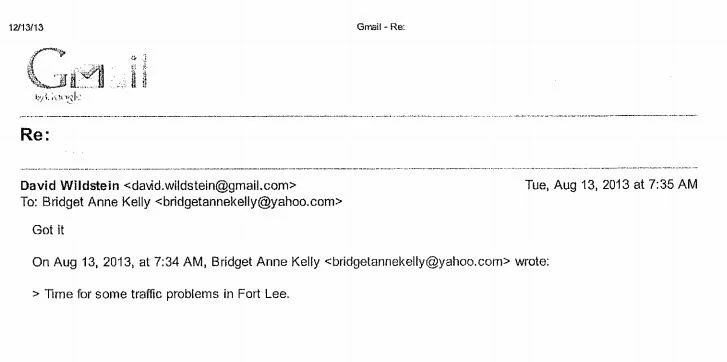Company Examples to Use in Your Classes
/H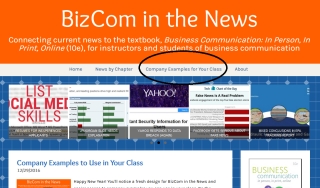 appy New Year! You'll notice a fresh design for BizCom in the News and easier access to company examples you can use in your classes. On the navigation bar under the title, select "Company Examples for Your Class" to see a list of chapters. For each, I'll post examples-videos, blog posts, letters, etc.-as I find them.
appy New Year! You'll notice a fresh design for BizCom in the News and easier access to company examples you can use in your classes. On the navigation bar under the title, select "Company Examples for Your Class" to see a list of chapters. For each, I'll post examples-videos, blog posts, letters, etc.-as I find them.
In almost every class, we talk about a news story or look at a company's communication. I find this approach engages students and shows them the relevance of what we teach. If you would like ideas on how to incorporate news in your class, I would glad to send you slides from an Association for Business Communication conference presentation and a webinar via Cengage Learning.
The news by chapter is now also in the navigation bar, and you can still use the search feature in the right-hand column.
Have a wonderful winter break,
Amy
Email: amynewman@cornell.edu
Company Examples for Chapter 1: Understanding Business Communication (Ethics, Legal, and Technology)
/Notre Dame Students Walk Out on VP Pence's Commencement Address (May 2017)
About 100 students left the stadium as Vice President Pence delivered his commencement speech. An interesting class discussion could focus on the ethics of their decision and their rationale, which they give in a statement.
Choate Apologizes for History of Abuse (April 2017)
This may be a tough topic for class, but Choate's open letter is interesting. I found it defensive, but maybe students would disagree.
Princess Cruises Apologizes for Oil Dumping (December 2016)
Princess Cruises, owned by Carnival, published several messages to apologize for illegally dumping oil-contaminated waste into the ocean. The company's communications certainly are prolific, but how honestly do they admit wrongdoing, and how well do they rebuild the brand?
A comment posted on YouTube under the president's video sums up one perspective: "[T]his video needs taking down and a new one with someone who looks sorry is put up. [H]er reading of this is terrible, like watching a 12yr old at a school play." (The writer needs to take one of our classes! But students might agree with his assessment.)
These examples can be used to discuss persuasive strategies (Chapter 7), oral presentations (Chapter 11), and ethics (Chapter 1):
"Bridgegate" Emails Confirm Guilt (November 2016, 2013)
I don't shy away from political topics, and the scandal of NJ Governor Chris Christie's staff closing a bridge lane is a good illustration of how email causes legal trouble. In November 2016, two of his associates were found guilty of creating traffic problems on the George Washington Bridge to retaliate against the Trenton, NJ, major. The email shown here is the most damning evidence in the case. The link, above, includes a written response from Christie and an interview.
Mylan CEO Defends Pricing (August 2016)
The EpiPen may save your life if you have an allergic reaction, but you'll pay a steep price for it. In this interview, Mylan CEO defends a $400 increase over five years. This is an ethical situation and can be used with Chapter 7 to discuss persuasive strategies.
Older Examples
Collection of companies' social media policies.
Apple's (leaked) social media policy.
Great email exchange by two lawyers (discussed in Chapter 1). Useful to discuss ethics, tone, and more. Here's a PowerPoint file to reveal the messages, and you can read more about the situation here.
Excerpts of Goldman Sachs emails (topic in Chapter 1) collected by the Wall Street Journal. As the WSJ reporter says, "The [Senate] committee will likely use many of the emails to illustrate Goldman's sometimes contradictory and unflattering statements about its role in the mortgage meltdown." Read more here.
National Labor Relations Board's memo about social media policies, 2012.
General Mills statement reverting back to its original legal terms.
A general's email about the value of reading. Read more about the situation.
Facebook communications: Communicating Our Community Standards and Guidelines, 2015.
Former Twitter CEO Dick Costolo's posts taking responsibility for cyberbullying on the site, 2015.
Browse News by Chapter
/
Student's Blog Post Gets Attention
/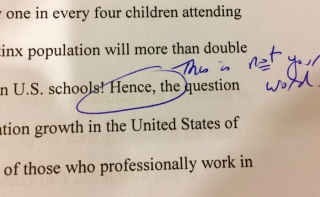 Suffolk University student Tiffany C. Martinez was accused of plagiarism, and she wrote a blog post that's gone viral. According to Martinez, her professor returned a paper to her in front of the classroom and said, "This is not your language." She then reviewed her comments.
Suffolk University student Tiffany C. Martinez was accused of plagiarism, and she wrote a blog post that's gone viral. According to Martinez, her professor returned a paper to her in front of the classroom and said, "This is not your language." She then reviewed her comments.
"Hence" was one example circled in the paper, and Martinez said her professor wrote on the paper, "Please go back and indicate where you cut and paste."
In a blog post titled, "Academic, Love Me Back," Martinez explained what happened and the impact on her. Here is an excerpt:
At eight o'clock this morning, I felt both disrespected and invalidated. For years I have spent ample time dissecting the internalized racism that causes me to doubt myself, my abilities, and my aspirations. As a student in an institution extremely populated with high-income white counterparts, I have felt the bitter taste of not belonging. It took until I used my cloud of doubt and my sociological training to realize that my insecurities are rooted in the systems I navigate every day. I am just as capable if not more so than those around me and my accomplishments are earned.
The acting president and provost wrote a letter to the university community, promising an investigation.
Discussion Starters:
- Read more of Martinez's account in her blog post. How would you describe her point of view?
- What's your view of the university's letter to the community?
- What response do you think the professor may have? How, if at all, can he or she explain her actions?
Bullied Off Twitter
/Mashable lists seven people who were "trolled" off Twitter. Although many more have likely quit the social media site, these celebrities took a harsh, public hit.
Lena Dunham, creator and star of Girls, said she was tired of reading, for example, "10 mentions that say I should be stoned to death." Iggy Azalea went off social media sites after a body-shaming photo of her in a bathing suit went viral. The most recent is Leslie Jones, star of the new Ghostbusters movie. Jones was subjected to racist and sexist comments by a known troll, who encouraged users to send her pictures of apes.
Twitter continues taking heat for not reacting quickly enough to shut down users' accounts. Jonathan Weisman, a New York Times editor who experienced anti-Semitism on Twitter, wrote, "I am awaiting some sign from Twitter that it cares whether its platform is becoming a cesspit of hate. Until then, sayonara." Journalist Julieanne Smolinski wrote, "Perhaps make hate speech a terminable violation of your terms of service,@twitter? Just a reasonable humane thought."
Discussion Starters:
- Should Twitter do more? This isn't the first time the company has been criticized.
- Is trolling worse on Twitter than on other social media sites? If so, why do you think this is the case?
Generation Gap: "Offen" or "Off-ten"
/ A clever piece in The Chronicle analyzes current pronunciation of often. Ben Yagoda questions recent pronunciations with the t.
A clever piece in The Chronicle analyzes current pronunciation of often. Ben Yagoda questions recent pronunciations with the t.
He starts by identifying an example in the podcast "Reply All," hosted by P.J. Vogt: "...Vogt is young (I would judge in his early 30s), and speaks with vocal fry, list lilt, uptalk, and, generally, a pronounced Ira Glass-esque lack of slickness."
Turns out, the t-pronunciation is a recent phenomenon. Early dictionaries indicate no t, but two 20th-century dictionaries indicate a shift, with one calling the pronunciation "vulgar," "certainly unnecessary," and "an affectation of refinement." Yagoda provides interesting evidence in speech from 12 "My Fair Lady" musical versions.
Yagoda concludes that younger people pronounce the t. He has seen a shift in pronunciation among his students and increasingly sees-as I do- "oftentimes" appearing in writing assignments. Good grief.
Discussion Starters:
- How do you pronounce often? Do you notice a generational difference?
- Assess Yagoda's evidence. What would strengthen his argument?
Adweek Rounds Up Best Ads of 2015
/Adweek has identified some of the best international ads of the past year. Topping the list are phenomenal Swedish skaters performing to the song "The Reindeer Herder's Joik" by Jon Henrik Fjällgren.
A commercial advertising organ donation uses a clever strategy:
Discussion Starters:
- Adweek identifies "fun" as a common theme of these ads. After watching more of them, what else do they have in common?
- What are your favorite commercials from 2015?
SeaWorld Responds to Harry Styles
/With two sentences, Harry Styles of One Direction contributed to SeaWorld's continuing decline. The trouble started with the movie Blackfish, which exposed the park's treatment of orca whales. Now, Credit Suisse analysts point to new culprits resulting in "a 400% spike in mentions and 13% increase in negative commentary month-over-month:"
"Brand impairment issues were magnified in July from allegations that a SeaWorld employee acted as an undercover member of activist group Peta, and after One Direction lead singer, Harry Styles, urged all of his fans to boycott SeaWorld during a concert in San Diego."
After Styles' performance, the company issued this statement:
"Dear Harry, we've seen a concert clip of you urging your fans not to visit SeaWorld. We want you to know we love dolphins too. We care for the animals in our parks like we would our own family.
"We are committed to making sure their lives are enriching and they are continually engaged socially, mentally and physically. And, we also care for animals in the wild.
"We invite you to see for yourself, and then decide based on facts. We are happy to open our doors, take you behind the scenes, and have our trainers and vets answer any questions you have."
New CEO Joel Manby acknowledged damage to the brand:
"We realize we have much work ahead of us to recover more of our attendance base, increase revenue and improve our performance as returning to historical performance levels will take time and investment. On the reputation side, early feedback on our campaign has been positive. However, we recognize that fully resolving our brand challenges in California will require sustained focus and commitment to correct misinformation."
Discussion Starters:
- How does a performer such as Styles have such a big impact? Do you believe Credit Suisse's assessment?
- What can SeaWorld do at this point to repair its brand image? Is it hopeless?
Pope Francis's Encyclical on the Environment
/ Pope Francis has weighed in on the environment, warning us about "unprecedented destruction of ecosystems" and terrible consequences. In a 184-page letter, the Pope criticizes our "throwaway culture" and appeals to our morality to address the issue. He highlights inequality throughout his message:
Pope Francis has weighed in on the environment, warning us about "unprecedented destruction of ecosystems" and terrible consequences. In a 184-page letter, the Pope criticizes our "throwaway culture" and appeals to our morality to address the issue. He highlights inequality throughout his message:
"The human environment and the natural environment deteriorate together; we cannot adequately combat environmental degradation unless we attend to causes related to human and social degradation. In fact, the deterioration of the environment and of society affects the most vulnerable people on the planet: both everyday experience and scientific research show that the gravest effects of all attacks on the environment are suffered by the poorest. For example, the depletion of fishing reserves especially hurts small fishing communities without the means to replace those resources; water pollution particularly affects the poor who cannot buy bottled water; and rises in the sea level mainly affect impoverished coastal populations who have nowhere else to go. The impact of present imbalances is also seen in the premature death of many of the poor, in conflicts sparked by the shortage of resources, and in any number of other problems which are insufficiently represented on global agendas. It needs to be said that, generally speaking, there is little in the way of clear awareness of problems which especially affect the excluded. Yet they are the majority of the planet's population, billions of people."
Although his tone is foreboding, Pope Francis does offer encouragement:
"Yet all is not lost. Human beings, while capable of the worst, are also capable of rising above themselves, choosing again what is good, and making a new start, despite their mental and social conditioning. We are able to take an honest look at ourselves, to acknowledge our deep dissatisfaction, and to embark on new paths to authentic freedom. No system can completely suppress our openness to what is good, true and beautiful, or our God-given ability to respond to his grace at work deep in our hearts. I appeal to everyone throughout the world not to forget this dignity which is ours. No one has the right to take it from us."
Discussion Starters:
- What's your view of the Pope's message? Why is he contributing in this way to the debate?
- Assess the value of an encyclical. What is the significance of this communication method?
USPS Misquotes Maya Angelou on Stamp
/The Unites States Postal Service is acknowledging Maya Angelou in a "Forever" stamp, but the quote isn't hers. Joan Walsh Anglund said this but replaced "it" with "he."
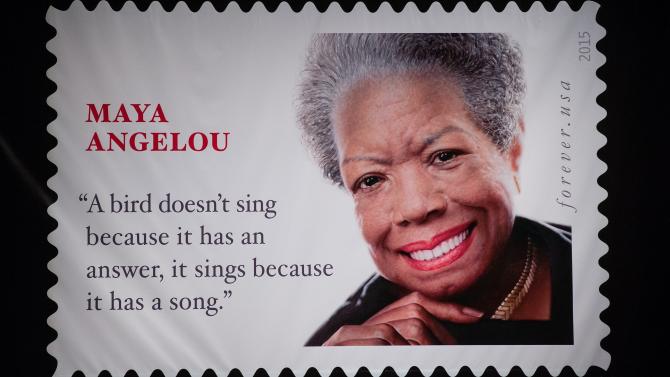
The designers may have confused the quote with her famous book, I Know Why the Caged Bird Sings. Another issue, of course, is the comma splice.
NPR summarizes responses from USPS:
USPS spokesman Mark Saunders responded to The Post, noting, "Had we known about this issue beforehand, we would have used one of [Angelou's] many other works. ... The sentence held great meaning for her and she is publicly identified with its popularity."
On Tuesday, David Partenheimer, another spokesman for the Postal Service, added: "The sentence was chosen to accompany her image on the stamp to reflect her passion for the written and spoken word."
In other words, the stamp stays.
Anglund was gracious about the error:
It's an interesting connection, and interesting it would happen and already be printed and on her stamp. I love her and all she's done, and I also love my own private thinking that also comes to the public because it comes from what I've been thinking and how I've been feeling."
Discussion Starters:
- How does a mistake like this happen, and how could it have been avoided?
- Assess USPS's response: tone, word choice, and the decision not to retract the stamp.
Wells Fargo Employee Asks for a Raise
/ In a bold email to the CEO, a Wells Fargo branch employee asked for a raise for all employees. Copying about 200,000 people, the employee cited income inequality, the CEO's compensation, and the bank's success as reasons to provide $10,000 to each employee.
In a bold email to the CEO, a Wells Fargo branch employee asked for a raise for all employees. Copying about 200,000 people, the employee cited income inequality, the CEO's compensation, and the bank's success as reasons to provide $10,000 to each employee.
Here's the beginning of Tyrel Oates' email:
Mr. Stumpf,
With the increasing focus on income inequality in the United States. Wells Fargo has an opportunity to be at the forefront of helping to reduce this by setting the bar, leading by example, and showing the other large corporations that it is very possible to maintain a profitable company that not only looks out for its consumers and shareholders, but its employees as well.
This year Wells Fargo in its second quarter alone had a net income of $5.7 billion, and total revenue of $21.1 billion. These are very impressive numbers, and is obvious evidence that Wells Fargo is one of, if not the most profitable company in the nation right now. So, why not take some of this and distribute it to the rest of the employees. (Read more.)
To me, his logic is flawed. An across-the-board increase does nothing to solve income inequality-and the request is oddly disconnected to Nadella's comments about women's pay at Microsoft just a few days ago.
In a Q&A with Business Insider, Oates says he's not worried about his job. He's going to college and wants to own an IT firm in the future.
Discussion Starters:
- If you were John Stumpf, the CEO of Wells Fargo, how would you respond to the email?
- Assess Oates' logic in the full email. Where do you see flaws in his persuasive arguments?
- What advice would you give Oates as he pursues plans to open an IT firm?
NFL Commissioner Changes Domestic Violence Policy
/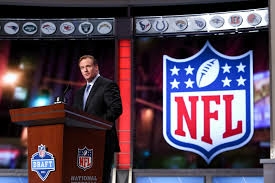 After criticism, NFL Commissioner Roger Goodell issued a 2000-word statement to change the league's domestic violence policy. Accused of assaulting his finance, Baltimore Ravens running back Ray Rice was suspended for two games.
After criticism, NFL Commissioner Roger Goodell issued a 2000-word statement to change the league's domestic violence policy. Accused of assaulting his finance, Baltimore Ravens running back Ray Rice was suspended for two games.
Backlash was fierce, with groups criticizing the punishment as too lenient-less than suspensions for some involvement with drugs.
Goodell admitted his mistake and changed the policy to six games after one incident of assault, battery, sexual assault, or domestic violence involving force. He included all employees in the policy. The New York Times describes the message sent to NFL owners as "a letter and accompanying memo" and called the change "stunning in its earnestness and clarity."
Here is excerpt from the entire message:
"At times, however, and despite our best efforts, we fall short of our goals. We clearly did so in response to a recent incident of domestic violence. We allowed our standards to fall below where they should be and lost an important opportunity to emphasize our strong stance on a critical issue and the effective programs we have in place. My disciplinary decision led the public to question our sincerity, our commitment, and whether we understood the toll that domestic violence inflicts on so many families. I take responsibility both for the decision and for ensuring that our actions in the future properly reflect our values. I didn't get it right. Simply put, we have to do better. And we will."
Discussion Starters:
- Describe Goodell's choice for a letter and memo. What were his other choices for conveying the message, and why did he choose these methods?
- Assess Goodell's letter and memo. What works well, and what could be improved? Consider the intended audiences and communication objectives.
NY Times' Leaked Report About Innovation
/Lucky us! Someone leaked an internal report from The New York Times about the company's digital strategy. With logical organization, wonderful supporting visuals, and a precise writing style, the authors outline where the company is missing readership and how to get their "journalism to readers."
The report was written by the newroom's innovation team, which spent six months analyzing the company's position and identifying new strategies.
The Full New York Times Innovation Report
The executive summary begins with the good news as well as a clear goal:
"The New York Times is winning at journalism. Of all the challenges facing a media company in the digital age, producing great journalism is the hardest. Our daily report is deep, broad, smart and engaging - and we've got a huge lead over the competition.
"At the same time, we are falling behind in a second critical area: the art and science of getting our journalism to readers. We have always cared about the reach and impact of our work, but we haven't done enough to crack that code in the digital era."
Discussion Starters:
- Who is the intended audience for the report? Now that it's been leaked, how might this group react? What might concern them-and make them proud?
- Analyze the report against guidelines in Chapter 10. What do you notice about the executive summary, organization, writing style, graphics, evidence, and so on?
The FTC Needs a Proofreader
/The Federal Trade Commission, the government agency responsible for consumer protection, needs to protect its own reputation. An embarrassing automated email response is riddled with errors.
Posted on Jim Romenesko's blog, the email received its share of snarky comments, such as this one:
Discussion Starters:
- What errors do you see in the email?
- How do mistakes like this happen?
- Do you consider this more embarrassing because it's from a federal government agency? Or would it be equally embarrassing from a corporate office?
H&R Block Continues to Fight Back Against TurboTax
/Since TurboTax attacked its employees, H&R Block hasn't stopped its defense. Last week, the company's CEO posted an email to employees, building them up after TurboTax commercials criticized them of being part-time, unprofessional tax advisors.
H&R Block has increased its communication, using its website, advertisements, social media, and more email. On the company website, CEO Bill Cobb posted this "open letter":
AN OPEN LETTER FROM BILL COBB, CEO OF H&R BLOCK
January 30, 2013
Dear Clients and Future Clients,
Today is the first day of tax season, and you might think I am writing an open letter in this forum to tell you that we are ready for you-and we are! But the real reason I am writing is because I am offended that TurboTax® is targeting our 90,000 H&R Block tax professionals in a series of commercials that we believe to be false and misleading.
TurboTax is trying to promote itself on the backs of our tax professionals, misusing our nearly 60-year-old brand and taking cheap shots at hardworking plumbers and retail sales clerks, not to mention millions of Americans holding down two jobs. We say no way-not on our watch.
I am incredibly proud of our tax professionals, who for nearly six decades have built the H&R Block brand, anchored by trust, and I will not let them be tarnished by some overzealous marketing campaign.
I would never disparage their people, but let me set the record straight about ours:
- We are the largest tax preparer in the industry.1
- We sign and stand behind every return we prepare for our clients in our offices.
- Since 1955, we have prepared and signed more than 500 million tax returns in our offices – TurboTax has prepared and signed 0.2
- We have over 7,000 Enrolled Agents (the highest credential awarded by the IRS) – more than any other tax preparation company.
- At our tax offices, the average client is served by a tax professional with over a decade of experience and hundreds of hours of training. 3
- We guarantee the accuracy of returns prepared by H&R Block tax professionals.
- And, if you're one of the millions of H&R Block At Home® software or online clients, our tax professionals will back you up, if needed, with audit support and in-person audit representation, which only H&R Block At Home® offers at no additional charge.
- Our first-in-industry independent research and analysis advisory group, The Tax Institute, is staffed primarily by CPAs, tax attorneys, enrolled agents and former IRS agents.
At H&R Block, we believe in our people. And you can meet some of these exceptional people at #IAMHRBLOCK on Twitter.
On behalf of our tax professionals and all the people of H&R Block, thank you for your respect, your consideration and your business. If we haven't seen you already this year, we look forward to seeing you soon. Call 1-800-HRBLOCK to make an appointment, or go to www.hrblock.com to get started.
Sincerely,
Bill Cobb
P.S. And to all the plumbers, retail sales clerks and other hardworking Americans, please know we would be honored to serve you.
A new commercial shows H&R Block tax professionals touting their credentials.
In a second email to employees, Cobb continued to show his support:
"You know I am proud of our tax pros, but I am also proud of the entire H&R Block organization that has risen up to defend our brand and tax pros. From the lawyers to our CSC support teams, field leaders and marketing teams, and of course our franchisees, there is a lot of energy behind this effort to set the record straight."
Discussion Starters:
- How effective is H&R Block's response? In what ways do the messages address concerns raised by the TurboTax ad?
- What are the strongest and weakest arguments in H&R Block's commercial and in the CEO's message?
Another NRA PR Failure?
/After its "train wreck" of a press conference, the National Rifle Association is taking heat for a commercial that mentions President Obama's daughters.
In response to the proposed gun control legislation, the ad accuses the president of protecting his own children but not the rest of the country:
"Are the president's kids more important than yours? Then why is he skeptical about putting armed security in our schools when his kids are protected by armed guards at their schools? Mr. Obama demands the wealthy pay their fair share of taxes, but he's just another elitist hypocrite when it comes to a fair share of security."
White House spokesperson Jay Carney called the commercial "repugnant and cowardly." Other critics, such as Republican New Jersey Governor Chris Christie, called the tactic "reprehensible."
In response to the criticism, NRA spokesperson Andrew Arulanandam said, "The president and his family enjoy 24-hour-security from law enforcement at taxpayer expense, and this ad asks very real questions: If it's good enough for the president, why shouldn't it be good enough for the rest for us?"
The NRA also issued a statement, focusing on safety:
"Throughout its history, the National Rifle Association has led efforts to promote safety and responsible gun ownership. Keeping our children and society safe remains our top priority."
Discussion Starters:
- What type of reasoning is the NRA using in its commercial? Do you find it fair, out of bounds, or something else?
- To what audiences would the NRA's ad appeal? Despite the criticism, how do you think these groups reacted?
- Read the NRA's statement. What do you consider the strongest and weakest arguments?
Videos for Chapter 5: Improving Your Writing Style
/Just for fun:
- "Real Marketing Genius" to illustrate overuse of jargon/buzz words.
- Scene from the TV show The Office to illustrate overuse of jargon.
- Weird Al's "Word Crimes."
Video Examples for Chapter 4: The Writing Process
/Just for fun: Commercial to illustrate the difference between "compliment" and "complement."


